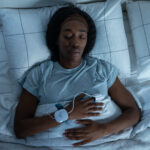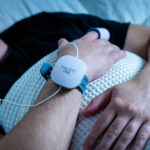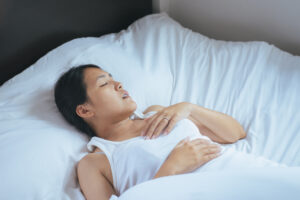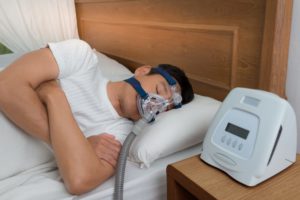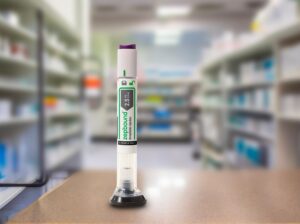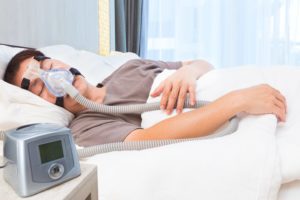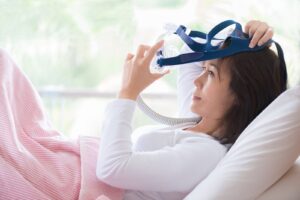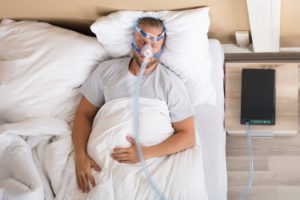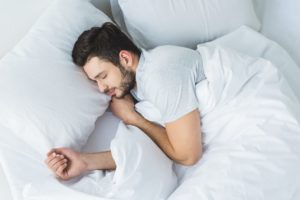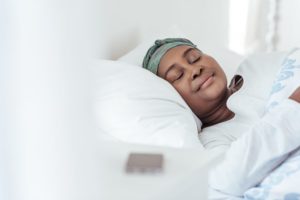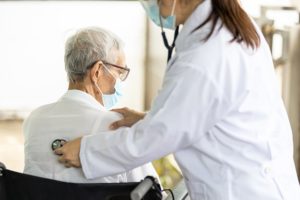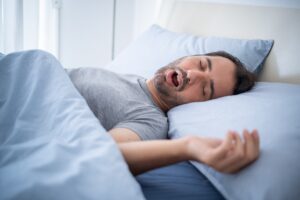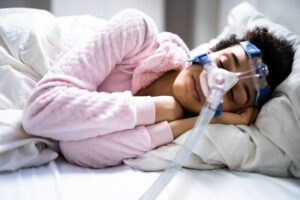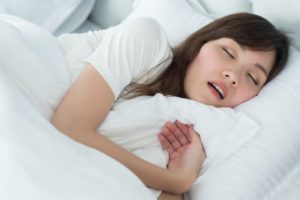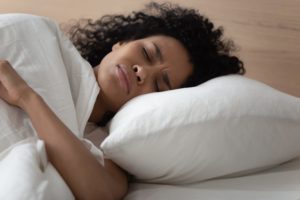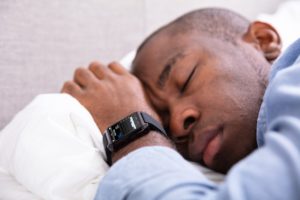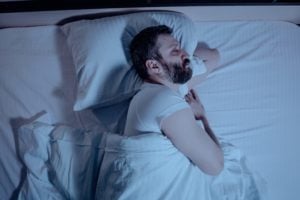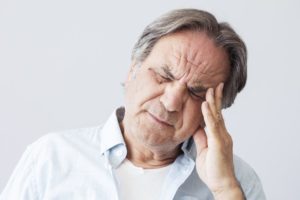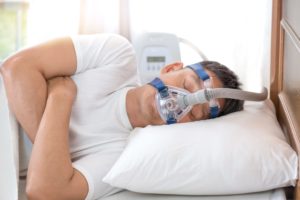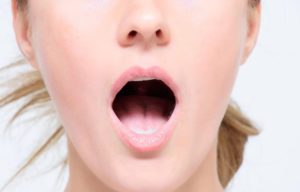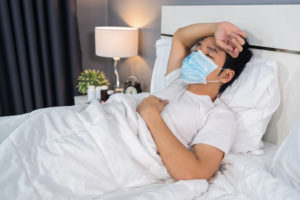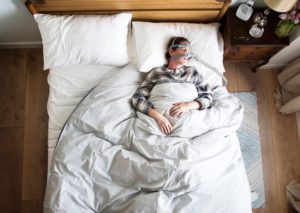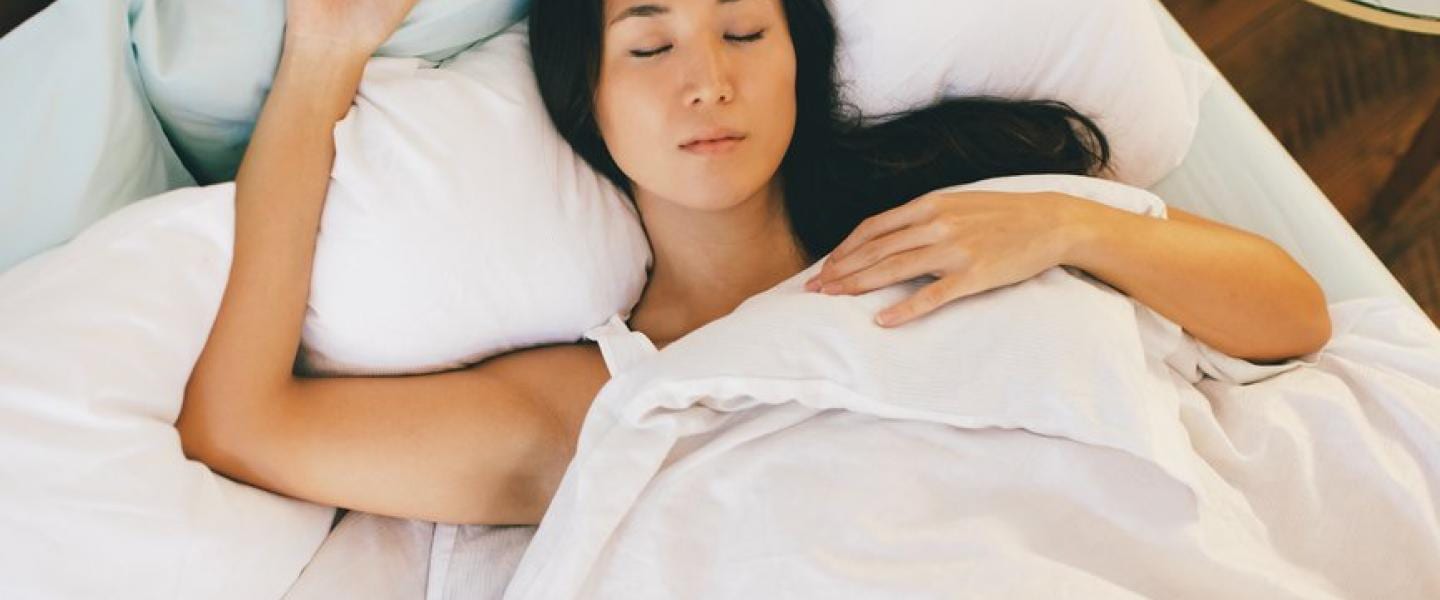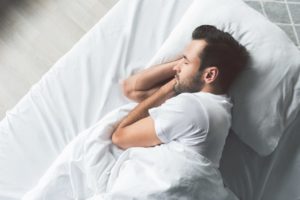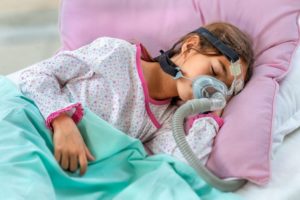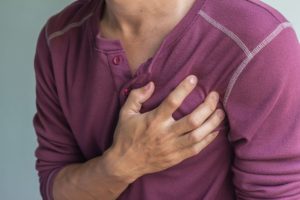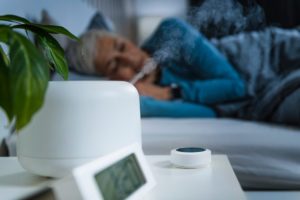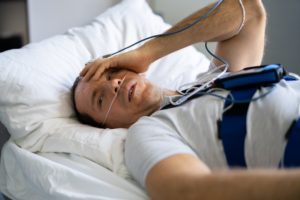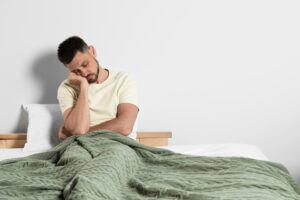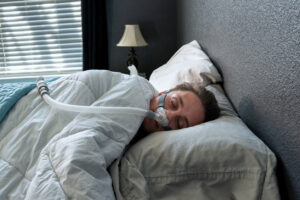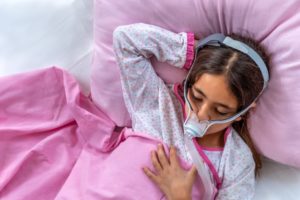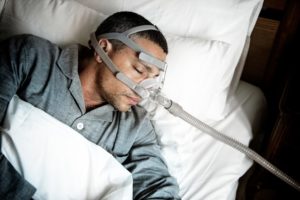When you buy through our links, we may earn a commission. Products or services may be offered by an affiliated entity. Learn more.
Sleep-Related Hypoventilation
Normal, healthy breathing is essential to keep your body functioning, whether you’re awake or asleep. When your breathing is too slow or too shallow, it’s called hypoventilation. When you hypoventilate, carbon dioxide levels rise in your body, while blood oxygen levels lower. An imbalance in these levels can be a sign of lung or kidney dysfunction. Hypoventilation also disrupts the quality of your sleep, leading to feelings of tiredness during the day.
What Is Sleep-Related Hypoventilation?
Sleep-related hypoventilation describes breathing that is too slow or shallow during sleep. The first signs of hypoventilation typically occur during sleep because when we’re awake, our brain can play a more active role in regulating our breathing. When we sleep, however, our brains and muscles relax. Hypoventilation is most severe during REM sleep.
Problematically, sleep-related hypoventilation reduces sleep quality, which leads to sleep deprivation. When we’re sleep-deprived, our brain’s ability to control breathing also becomes impaired, creating a vicious cycle. Sleep-related hypoventilation can also increase your risk for pulmonary artery hypertension, right-sided heart failure (cor pulmonale), and neurocognitive disorders.
What Causes Sleep-Related Hypoventilation?
Chronic hypoventilation can appear with a number of lung and respiratory disorders. While some people exhibit hypoventilation as early as childhood, it’s more common to develop due to obesity, an underlying medical disorder, or drug use.
People with chronic obstructive pulmonary disease (COPD) are significantly more likely to have sleep-related hypoventilation. Other underlying medical conditions that have been linked to sleep-related hypoventilation include obesity, lung and respiratory diseases, and neurological and musculoskeletal disorders.
Chronic use of certain medications or drugs may also lead to sleep-related hypoventilation. Long-term use of narcotics, anesthetics, sedatives, opioids, muscle relaxants, and alcohol may all increase your risk for sleep-related hypoventilation. One study of individuals with chronic pain found that up to 50% of those on long-term opioid therapy also had hypoventilation.
Symptoms of Sleep-Related Hypoventilation
People with sleep-related hypoventilation may report symptoms like:
- Daytime fatigue
- Difficulty exercising
- Excessive daytime sleepiness
- Morning headaches
- Poor sleep quality
- Shortness of breath
Diagnosing Sleep-Related Hypoventilation
When diagnosing sleep-related hypoventilation, doctors will ask you to describe your breathing and sleep quality. Some people with sleep-related hypoventilation may not report any sleep-related symptoms, so doctors may ask about daytime symptoms, such as headaches, fatigue, or trouble exercising.
Sleep-related hypoventilation is officially diagnosed when a person’s blood oxygen levels decrease below 90% for five minutes or longer during sleep, and their carbon dioxide levels stay elevated for ten minutes or longer.
What Is Obesity-Related Hypoventilation Syndrome?
Between 10% to 20% of obese adults with obstructive sleep apnea may develop obesity hypoventilation syndrome (OHS). Like with sleep-related hypoventilation, their breathing is too slow or too shallow, leading to higher carbon dioxide and lower oxygen levels in their blood.
Overall, OHS is generally rare in the general population, affecting less than one-half of a percent of people. It’s a common cause of sleep problems, though, with as many as 20% of people who visit a sleep clinic displaying symptoms of OHS.
Left untreated, OHS can lead to serious heart problems, depression, disability, and death. It’s essential to diagnose OHS early, as people with OHS have a 23% chance of dying within 18 months. With proper treatment, however, that number can fall to 3%.
What Causes Obesity-Related Hypoventilation Syndrome?
Researchers do not yet know with certainty what causes OHS. It’s possible something occurs in the brain which interferes with its ability to control breathing, or that the person’s extra weight makes it harder for them to breathe deeply and quickly.
Symptoms of Obesity-Related Hypoventilation Syndrome
The primary symptoms of OHS are slow or shallow breathing, so the person may report feeling short of breath or tired. Because hypoventilation interferes with sleep, many OHS symptoms stem from sleep issues. These may include:
- Blue or reddish color in the skin, lips, fingers, or toes
- Depression
- Excessive daytime sleepiness
- General tiredness
- Headaches
- Poor sleep quality
- Swollen legs or feet, or other signs of heart failure
Obstructive sleep apnea (OSA), a sleep-related breathing disorder, commonly occurs alongside hypoventilation.
OSA is a common sleep-related breathing disorder, affecting around 2% to 7% of adults. When people have OSA, their upper airway completely or partially collapses during sleep, leading to temporary lapses in breathing and decreased blood oxygen levels. Even if the person doesn’t consciously wake up from the pause in breathing, these lapses (known as apneas) force the brain to kickstart breathing again, disrupting sleep quality and increasing their risk of cardiovascular disease.
While OSA and OHS commonly overlap, doctors can distinguish between the two conditions. People with OHS have high carbon dioxide levels in their blood at all times, while people with sleep apnea may only have it while they are asleep.
Think You May Have Sleep Apnea? Try an At-Home Test
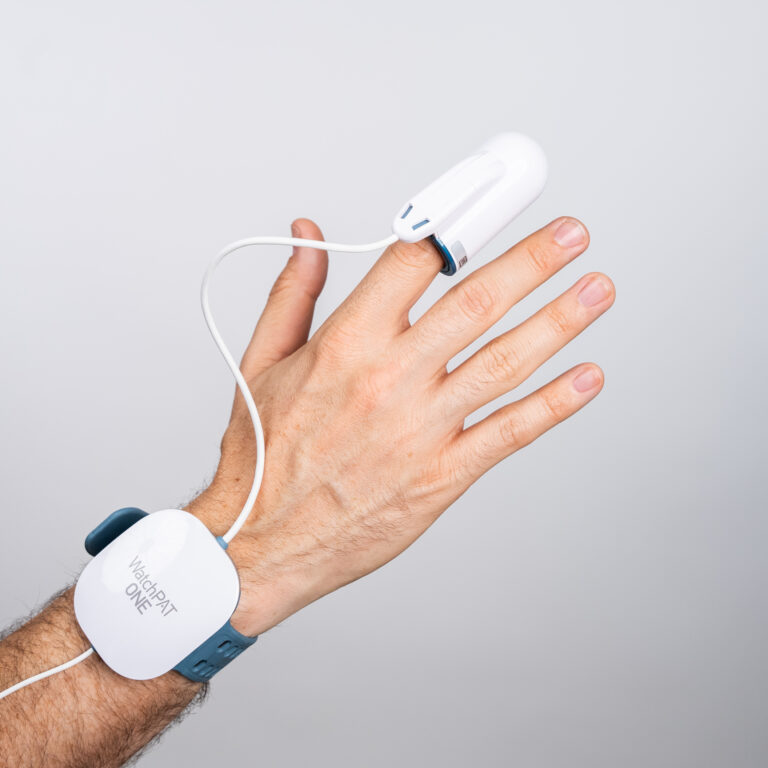
our partner at sleepdoctor.com
Save 54% on your Sleep Test Today
Shop Now“Truly grateful for this home sleep test. Fair pricing and improved my sleep!”
Dawn G. – Verified Tester
Diagnosing Obesity-Related Hypoventilation Syndrome
When diagnosing OHS, your doctor will conduct a physical exam and ask you about your sleep quality, breathing issues, daytime fatigue, and any signs of depression. They may order a chest x-ray, CT scan, echocardiogram (an ultrasound of your heart), and other tests to assess your blood and lung function. For example, an arterial blood gas test measures the levels of carbon dioxide and oxygen in your blood, and can help diagnose OHS as well as sleep-related hypoventilation.
To test for sleep apnea, your doctor may order a polysomnogram. During a polysomnogram, you spend the night sleeping in a lab while doctors monitor your brain waves, breathing, heart rate, and blood oxygen levels. A polysomnogram can also help doctors determine the severity of your breathing issues during sleep versus wakefulness.
Treatment for Hypoventilation
When recommending treatment for hypoventilation, doctors start by focusing on the underlying condition first. If drugs contribute to your hypoventilation, your doctor may recommend alternative medications, lower doses, or ceasing the drug use altogether. Never stop taking medication without speaking to your doctor first.
Treatment for hypoventilation, whether sleep-related or obesity-related, usually involves special ventilation machines that help the person breathe better. This may include oxygen therapy or ventilation support via a tracheostomy tube. Non-invasive ventilation techniques (NIV) like these have been shown to improve a person’s quality of sleep and rebalance their blood gas levels. There’s also some evidence that NIV improves survival rate. In patients with COPD and hypoventilation, NIV reduced the patients’ chance of death from 33% to 12%.
Continuous positive airway pressure (CPAP) and bilevel positive airway pressure (BiPAP) therapies may be prescribed to help with sleep apnea symptoms. Intended to be used at night, these machines deliver pressurized air to a person as they sleep via a face mask that sits over the nose or mouth and is connected to the machine by a hose. The constant delivery of air helps keep the person’s airways open, enabling them to breathe better during sleep, improving their blood gas levels and sleep quality. Certain BiPAP therapies can be configured to simultaneously treat Obstructive Sleep Apnea along with OHS. Along with positive airway pressure, these devices can deliver a target volume as well effectively helping ventilate patients.
In the case of OHS, diet or weight loss plans may be recommended to help reverse the condition.
If you believe you may have OHS or sleep-related hypoventilation, consult your doctor. They can help you determine the cause behind your sleep and breathing problems, and recommend treatments to help you feel better.

Still have questions? Ask our community!
Join our Sleep Care Community — a trusted hub of sleep health professionals, product specialists, and people just like you. Whether you need expert sleep advice for your insomnia or you’re searching for the perfect mattress, we’ve got you covered. Get personalized guidance from the experts who know sleep best.
References
6 Sources
-
Schäfer T. (2006). Respiratory pathophysiology: sleep-related breathing disorders. GMS Current Topics in Otorhinolaryngology, Head and Neck Surgery, 5, Doc01.
https://pubmed.ncbi.nlm.nih.gov/22073070/ -
Beuther D. A. (2009). Hypoventilation in asthma and chronic obstructive pulmonary disease. Seminars in Respiratory and Critical Care Medicine, 30(3), 321–329.
https://pubmed.ncbi.nlm.nih.gov/19452392/ -
Chau, E. H., Lam, D., Wong, J., Mokhlesi, B., & Chung, F. (2012). Obesity hypoventilation syndrome: a review of epidemiology, pathophysiology, and perioperative considerations. Anesthesiology, 117(1), 188–205.
https://pubmed.ncbi.nlm.nih.gov/22614131/ -
A.D.A.M. Medical Encyclopedia. (2019, July 23). Obesity hypoventilation syndrome (OHS)., Retrieved May 6, 2021, from
https://medlineplus.gov/ency/article/000085.htm -
Riha R. L. (2015). Diagnostic approaches to respiratory sleep disorders. Journal of Thoracic Disease, 7(8), 1373–1384.
https://pubmed.ncbi.nlm.nih.gov/26380763/ -
Liu, C., Chen, M. S., & Yu, H. (2017). The relationship between obstructive sleep apnea and obesity hypoventilation syndrome: a systematic review and meta-analysis. Oncotarget, 8(54), 93168–93178.
https://pubmed.ncbi.nlm.nih.gov/29190986/


